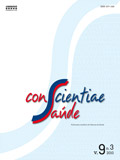Correlation between body fat mass, muscle strength, respiratory muscle strength and function in Duchenne Muscular Dystrophy
DOI:
https://doi.org/10.5585/conssaude.v9i3.2320Keywords:
Body composition, Duchenne muscular dystrophy, Muscle strength, Obesity, Respiratory function tests.Abstract
Introduction: Obesity affects the functional performance of people in a meaningful way, and probably with more intensity people with muscle dysfunction and/ or neurological disorders. Objective: To evaluate the correlation between body fat mass and muscle strength, respiratory muscle strength and function in subjects with DMD. Methods: The study enrolled 68 subjects with DMD aged 5 to 20 years. Muscle strength was evaluated by manual testing and maximal respiratory pressures through the manuvacuometry. Vignos test was collected by direct observation. The body fat mass was evaluated using impedance analysis and the index of body composition by weight and height. Data analysis consisted of descriptive statistics and construction of regression models. Results: There was significant correlation between the dependent values and perceptual body fat and age. Conclusion: We conclude that there is a correlation between percentual body fat to muscle force, pressure and respiratory function in subjects with DMD.Downloads
Download data is not yet available.
Downloads
Published
2010-09-30
How to Cite
1.
Caromano FA, Gomes ALO, Pinto AN, Góes Érica R de, Hirosue LN, Assis SMB de, et al. Correlation between body fat mass, muscle strength, respiratory muscle strength and function in Duchenne Muscular Dystrophy. Cons. Saúde [Internet]. 2010 Sep. 30 [cited 2025 Apr. 2];9(3):423-9. Available from: https://uninove.emnuvens.com.br/saude/article/view/2320
Issue
Section
Applied Sciences
License
Copyright (c) 2010 ConScientiae Saúde

This work is licensed under a Creative Commons Attribution-NonCommercial-ShareAlike 4.0 International License.
Views
- Abstract 694
- PDF (Português (Brasil)) 527







